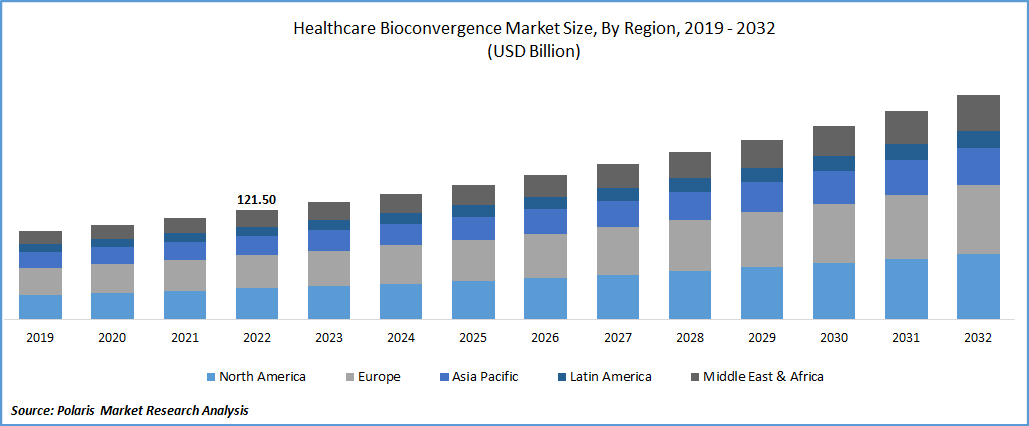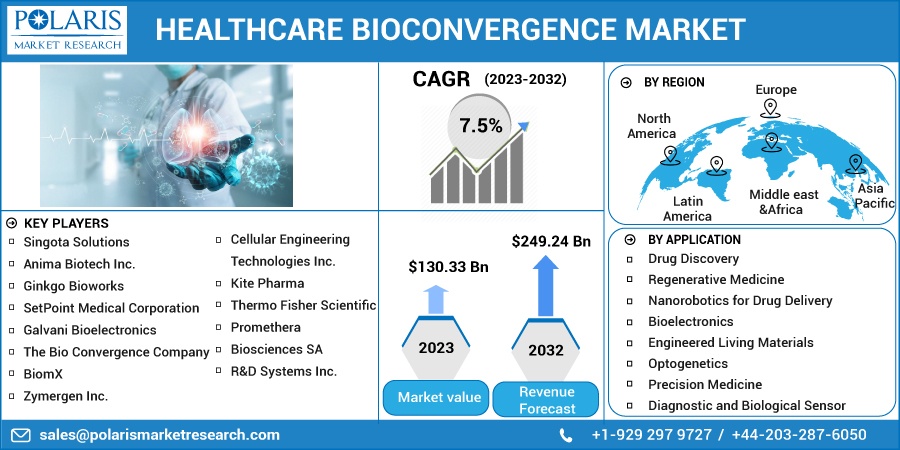
Healthcare Bioconvergence Market Share, Size, Trends, Industry Analysis Report
By Application (Drug Discovery, Regenerative Medicine, Nanorobotics for Drug Delivery, Bioelectronics, Engineered Living Materials, Optogenetics, Precision Medicine, and Diagnostic and Biological Sensor); By Region; Segment Forecast, 2023 - 2032
- Published Date:Jan-2023
- Pages: 116
- Format: PDF
- Report ID: PM2970
- Base Year: 2022
- Historical Data: 2019-2021
Report Outlook
The global healthcare bio convergence market was valued at USD 121.50 billion in 2022 and is expected to grow at a CAGR of 7.5% during the forecast period.
The advent of Industry 4.0 in the healthcare sector, involves the adoption of a variety of advanced and innovative technologies including machine learning, artificial intelligence, the Internet of Things, Digitalization, Big Data Mining, and Cloud Computing along with the high reliance on and amalgamating on IT, biology, bioengineering, and biology are key factors positively impacting the growth of the global market. Bioconvergence is mainly the mass convergence of several fields and technologies, which is considered the rising technological wave of the 21st century.

Know more about this report: Request for sample pages
Moreover, the rapidly growing prevalence of chronic diseases across the globe influencing and encouraging key market players to innovate new ground-breaking discoveries in the field of bio convergence is expected to create new growth opportunities for the healthcare bio convergence market in the coming years. In addition, it can also be used in a variety of other applications like gene therapy, drug delivery, regenerative medicine, precision medicine, and biological sensors for the accuracy and effective diagnosis of chronic disorders.
For instance, according to a report by Pan American Health Organization, noncommunicable diseases cause more than 41 million deaths each year worldwide, which equals 71% of the total number of global deaths. Cardiovascular diseases account for the highest number of NCD deaths with 17.9 Mn people annually, followed by cancers with 9 Mn deaths. And, NCDs kill over 5.5 Mn people each year in America only.
However, expensive and high-cost procedures and regulatory complications implied by several government organizations along with the ethical and moral frameworks of healthcare bio convergence are key factors projected to hamper the demand and growth of the global market during the forecast period. In addition, limited awareness of the availability of various treatment options mainly in low and medium-sized economies around the world is likely to restrain the overall growth of the market in the near future.
The outbreak of the COVID-19 pandemic has positively impacted the growth of the healthcare bio convergence market. Due to the rapid spread of the deadly coronavirus across the globe, the need and demand for advanced and innovative healthcare technology grew drastically. During the pandemic period, AI-based healthcare tools were helping in the prediction of peptide bonds and drugs from genomic sequences of an infected individual and resulting in the rapid surge of development and advancements in processes by reducing the overall time required to bring a drug into the market.
 Know more about this report: Request for sample pages
Know more about this report: Request for sample pages
Industry Dynamics
Growth Drivers
The rapidly emerging stem cell technology for the diagnosis and fixing of injured cells, organs, and tissues and the combination of various highly developed technologies like robotics, machine learning, cloud computation, ergonomics, and artificial intelligence across the globe are major factors driving the growth of the global market. Also, the ability of healthcare bio convergence for the improvement of several other industries including agriculture, food, security, climate, and energy is likely to have a positive impact on market growth over the next coming years.
For instance, in January 2022, Cellino Biotech, a leading cell therapy service provider company, raised about USD 80 million in its Series A financing round. With this raise fund, the company plans to expand access to stem-based cell therapies with the help of the first autonomous human cell foundry, which is expected to complete in 2025.
Furthermore, the continuously growing prevalence and burden of antimicrobial resistance and the extensive rise of superbugs around the world have influenced key players to increase their attention on combatting the insidious and increasing epidemic of superbugs, which is projected to positively impact the adoption of bio convergence. Also, the increasing surveillance of antimicrobial consumption and drug resistance by humans has resulted in an increased need for advanced analytical tools, that are rapid and precise and likely to emerge as a future trend for biomedicine in the next coming years.
Report Segmentation
The market is primarily segmented based on application and region.
|
By Application |
By Region |
|
|
Know more about this report: Request for sample pages
The Drug Discovery Segment Accounted for the Largest Market Share in 2022
The drug-discovery segment accounted for the largest global market share, in 2022, and is expected to retain its position over the period. Growth is attributed to the increasing prevalence of a wide range of diseases, rising healthcare investments, and approaching patent expiration of popular medications. In addition, the growing consequences of a variety of ailments among all age categories and a high number of approvals for several clinical trials on stem cell therapies are further anticipated to boost the growth and demand of the segment market.
However, the regenerative medicine segment is anticipated to grow at the fastest CAGR during the forecast period owing to the increasing need and demand for replacing or healing damaged cells, organs, and tissues, which are deformed due to any type of disorder, trauma, and age. Moreover, several government and healthcare organizations are heavily investing in the development and improvement of regenerative medicines, which is fueling the demand and growth of the market.
In May 2022, the University of Colorado Anschutz Medical Campus, announced its new investment of USD 200 million investment in the next 5 years for the purpose to create the Gates Institute, advanced research, and treatment center, that will focus on the enhancement and development of new regenerative, gene, and cellular therapies.
Europe Dominated the Global Market With holding a Majority Share
In 2022, Europe dominated the global market and accounted for a considerable market revenue share which is projected to grow significantly over the anticipated period. The wide presence of leading advanced research institutes, medical centers, and developed hospitals, which provide innovative scientific and medical treatments and serve as a solid basis are key factors boosting the growth of the market in the region. In addition, with the rising decentralization and remote interactions in the healthcare sector, several businesses mainly in countries like France and Germany are looking to integrate more supply and developed manufacturing steps and further expand their range of digital capabilities to enable real-time operations and supply monitoring and management.
Furthermore, Asia Pacific region is anticipated to emerge as the fastest growing region during the projected period due to the huge patient population base and continuously growing rate of various types of diseases such as cancer, diabetes, and neurological disorders, especially in countries like India and China. Additionally, increasing government funding to accelerate the research of bio convergence and related fields to strengthen the regional market growth and provide improved healthcare facilities to their patients.
For instance, in February 2022, GOI announced the set-up of new stem cell research facilities across 40 different leading health research institutions. Indian Council of Medical Research has released over USD 80 million under various stem cell & cutting-edge ad-hoc projects.
Competitive Insight
Some of the major players operating in the global market include Singota Solutions, Anima Biotech Inc., Ginkgo Bioworks, SetPoint Medical Corporation, Galvani Bioelectronics, The Bio Convergence Company, BiomX, Zymergen Inc., Cellular Engineering Technologies Inc., Kite Pharma, Thermo Fisher Scientific, Promethera Biosciences SA, R&D Systems Inc.
Recent Developments
- In January 2022, the Department of the Health Abu Dhabi & the Israel Innovation Authority entered into a partnership for health innovation projects in areas of key strategic importance such as proof of concept projects & clinical trials.
Healthcare Bio convergence Market Report Scope
|
Report Attributes |
Details |
|
Market size value in 2023 |
USD 130.33 billion |
|
Revenue forecast in 2032 |
USD 249.24 billion |
|
CAGR |
7.5% from 2023 – 2032 |
|
Base year |
2022 |
|
Historical data |
2019 – 2021 |
|
Forecast period |
2023 – 2032 |
|
Quantitative units |
Revenue in USD billion and CAGR from 2022 to 2030 |
|
Segments Covered |
By Application, By Region |
|
Regional scope |
North America, Europe, Asia Pacific, Latin America, Middle East & Africa |
|
Key companies |
Singota Solutions, Anima Biotech Inc., Ginkgo Bioworks, SetPoint Medical Corporation, Galvani Bioelectronics, The Bio Convergence Company, BiomX, Zymergen Inc., Cellular Engineering Technologies Inc., Kite Pharma, Thermo Fisher Scientific, Promethera Biosciences SA, R&D Systems Inc. |
FAQ's
The global healthcare bioconvergence market size is expected to reach USD 249.24 billion by 2032
key players are Singota Solutions, Anima Biotech Inc., Ginkgo Bioworks, SetPoint Medical Corporation, Galvani Bioelectronics, The Bio Convergence Company, BiomX, Zymergen Inc.
Europe contribute notably towards the global healthcare bioconvergence market.
The global healthcare bio convergence market expected to grow at a CAGR of 7.5% during the forecast period.
key segments are application and region.
